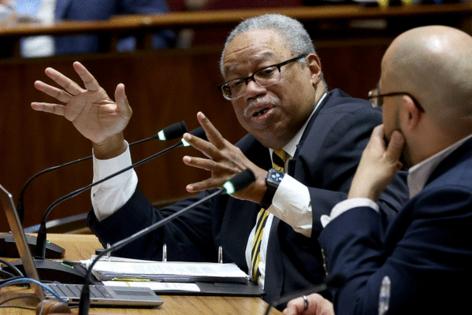Gov. JB Pritzker says 'evolution of the leadership' needed at CTA
Published in News & Features
SPRINGFIELD, Il. — Gov. J.B. Pritzker called for an “evolution of the leadership” at the CTA, as embattled agency President Dorval Carter has looked to Springfield for solutions to a looming budget crisis.
Carter has found himself in the hot seat as the CTA struggled in recent years to provide frequent, reliable and safe service. At the same time, the Illinois General Assembly is weighing a sweeping set of recommendations about what Chicago-area transit could look like in the future, including whether the CTA should be consolidated with Metra and Pace into one agency and how to address a transit fiscal cliff expected when federal pandemic aid runs out.
Thursday night, from his ceremonial office in the Illinois State Capitol, Pritzker said changes were needed at CTA, and “that’s going to take some new leadership and additional leadership.”
“I think that there needs to be an evolution of the leadership in order for us to get where we need to go with CTA,” he said, during an unrelated news conference.
Though CTA is based in Chicago, Pritzker has some measure of control over the agency, appointing three of the transit board’s seven members. And the recommendations under consideration by lawmakers have heightened the importance of Carter’s relationship with state officials.
The recommendations come as the region’s public transit agencies face a combined $730 million budget hole once federal COVID-19 relief funding starts running out, which could be as soon as 2025. The agencies have warned that failure to plug the hole could lead to catastrophic service cuts and fare increases.
So the Chicago Metropolitan Agency for Planning drafted a set of recommendations, sent to lawmakers in December, to address public transit funding, governance and the experience of riding buses and trains, proposing $1 billion or more in new public funding annually, options to revamp oversight of the region’s transit agencies and other suggestions. Many of the suggestions are likely to be politically contentious, which makes the CTA’s relationship with lawmakers crucial during negotiations.
CTA recently has faced a range of challenges, including so-called ghost buses and trains, long wait times and concerns about personal safety, both real and perceived.
Carter has come under fire as complaints have mounted, drawing the attention of some elected officials. Chicago aldermen tried for a year to require Carter and CTA officials to regularly testify before they succeeded. Later, in February, they brought him before City Council as part of a new requirement that CTA officials appear for quarterly committee hearings.
Pritzker’s comments about Carter reflect the latest sentiments out of Springfield about how state officials believe the CTA needs improvement under his leadership.
Just last week, the Illinois Senate unanimously passed bipartisan legislation related to a serious collision in November between a CTA train and snowplow near Chicago’s border with Evanston that left at least 16 people injured, seven of them CTA employees. The measure, which now moves to the House for consideration, would require annual reports from the CTA, Illinois Department of Transportation, Regional Transportation Authority and Metra detailing the safety recommendations made over a one-year period from the National Transportation Safety Board, as well as the status of their implementation.
The reports, which would spell out the recommendations and the transportation agencies’ progress in following them by Dec. 31 of each year, must be viewable to the public online as well as to the General Assembly.
Sarah Freishtat reported from Chicago.
____
©2024 Chicago Tribune. Visit at chicagotribune.com. Distributed by Tribune Content Agency, LLC.







Comments